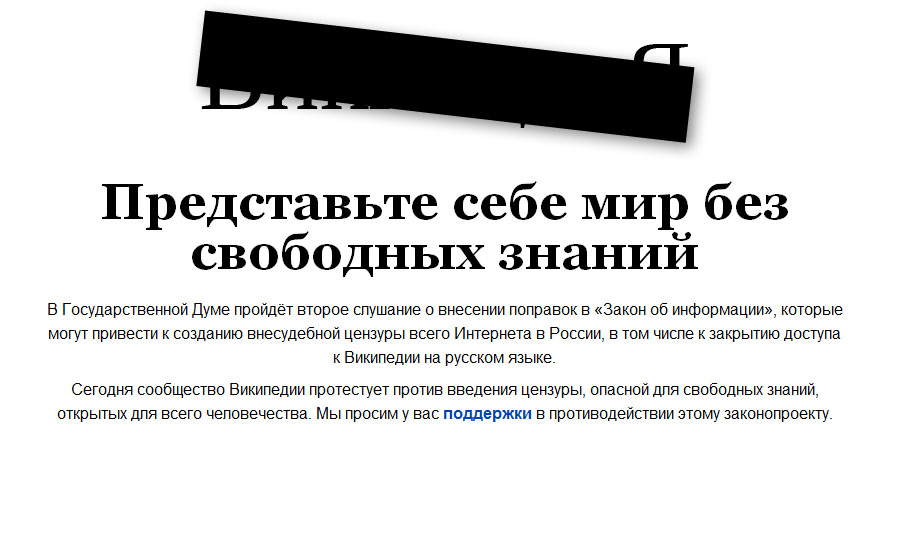Russian-language Wikipedia goes dark to protest Internet blacklist law
The Russian-language version of Wikipedia will be dark for 24 hours to protest a proposed law that would allow a government agency to blacklist websites containing pornography, drug advertisements or extremist ideas. The Duma, Russia’s parliament, is slated to review the controversial amendments to the country’s “Law on Information” for the second of three readings on Wednesday.
Supporters of the amendments — titled “On the protection of children from information harmful to their health and development” — say the federal register of banned websites will help stop the spread of pornography and extremist propaganda. Opponents argue the scope of the law is too vague, allowing the government too much latitude in determining what sites can be banned and opening the door to greater online censorship.
Under the law, websites “that contain pornography or drug references, or that promote suicide or other ‘extremist ideas,’ will face blacklisting.” Websites breaking the law will have 24 hours to remove objectionable content before Internet service providers are expected to shut down websites. Roskomnadzor, Russia’s federal communications regulator, will supervise the registry of banned websites, but a non-profit organization will monitor compliance with takedown requests. According to some media reports, courts and the security services can also add websites to the blacklist.
In response to this legislation, visitors to the Russian-language Wikipedia homepage are greeted by a message that reads (translated):
Imagine a world without free knowledge. The Duma will hold a second hearing on the introduction of amendments to the Law on Information, which could lead to the creation of extrajudicial censorship of all the Internet in Russia, such as shutting down access to Wikipedia in Russian. Today the Wikipedia community protests the introduction of censorship, which is dangerous to the free knowledge open to all mankind. We ask you for support in opposing this legislation.
In a linked page explaining its decision, Wikipedia further outlines its concerns that “these amendments could become the basis for real censorship of the Internet” by forming a “list of banned websites and IP addresses” that can subsequently be filtered.
Livejournal, which is Russia’s most popular blogging platform, remains operational, but also outlines its concerns regarding the law on its website:
In practice this means that a provider will be able to block a certain site on ministerial orders without a court’s judgment. We believe that the amendments to the law can lead to censorship in the Russian segment of the Internet, creating a blacklist, stop-lists and blocking certain sites. Unfortunately, the practice of law in Russia indicates a high probability of the worst-case scenario.
In January, the English-language version of Wikipedia and other websites like reddit instituted a similar blackout to protest anti-piracy legislation in the United States Congress.
Russia’s Internet (RuNet) is a growing source of independent information in a mass media environment dominated by state-owned television channels and few independent media sources. RuNet remains relatively free in comparison to the “Great Firewall” of neighboring China. Internet use is on the rise with 38 percent of Russians using the Internet daily, up from 22 percent two years ago. Over the past eight months, blogs and social media have been key to organizing massive street protests across Russia following the December 2011 Duma election. One of the key opposition figures to arise from the protests is a popular anti-corruption blogger, Alexei Navalny, who noted on his blog that this proposed legislation was an attempt by the Kremlin to win an ideological battle over the Internet.
Read a translation of the Russian amendments here (by Google Translate).
